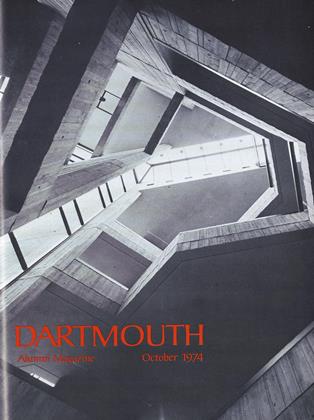By JohnClark Pratt '54. New York: The VikingPress, 1974. 245 pp. $7.95.
One pilot says to another over the interphone, "You know, Bill, I really love this country." In an unreported war they are flying observation planes over Laos, searching for something to strike. Laos is a nice place to bomb, but you wouldn't want to live there (because of the war), so you live Tailand and commune. Air war is a commuter war, with a pitcher of martinis, good dinner, and pleasant company waiting for you back at the base.
The Laotian Fragments is a fine novel that reminds us again that war can be beautiful. War may be hell to "that valiant little guy on the ground with the rifle," as the Chief describes the Laotians, but war is a gas for the fly guys. Aesthetic distance begins about a mile up in the blue.
The author's true feelings about all this are well hidden, no doubt because he is a lieutenant colonel and teaches at the U.S. Air Force Academy, but he has woven some hints into the novel's fabric, like alluding to Heller's Catch-22 and Vonnegut's Slaughterhouse Five, two of the best anti-war novels preceding this one. His strongest hint is in naming his hero William Blake, thus evoking that notorious prophet-against-empire who denounced England's foreign policy over its American colonies in his symbol-veiled poetry. The American war was Blake's Indo-China war: it disillusioned him about the wisdom of his country's government. Major Bill Blake's disillusionment comes just before leading an airstrike where he is shot down and declared MIA; it is as if his staying aloft depended on his belief in being up there.
Besides its moral seriousness, which few novels have today, The Laotian Fragments is also a successful experiment in form. It is literally a "documentary novel," composed entirely of documents (military dispatches, personal letters, Xeroxed memos, journals, and transcripts of taped conversations) bequeathed to a fictional "editor" by Blake's widow. Each document is described in best bibliographic style (e.g. holograph letter on standard airmail stationery, 7" X 9½"). The form of the novel says: here is the evidence, presented with scholarly objectivity; draw your own conclusions.
Its finest moments come from the in-flight talk, during the visual airstrikes and search-and-rescues, recorded on cassettes by plugging into the interphone.
GORDO LEAD: You're on, babes. Lead's in hot, FAC in sight.
HAMILTON: Come on, Gordo. Down the chute. There he goes, he's released. Look at that beautiful big bomb.... Christ, look at those secondaries.
It is compelling oral history of the war that never was.
Mr. Bowman teaches at Memphis StateUniversity.
 View Full Issue
View Full Issue
More From This Issue
-
 Feature
Feature"THE KINGDOM OF GOD HAS COME"
October 1974 By MARy BISHOP ROSS -
 Feature
FeatureMore than a beast, Less than an angel
October 1974 By PETER A. BIEN -
 Feature
FeatureMountain of Storms
October 1974 By ANDREW HARVARD, TODD THOMPSON -
 Feature
FeatureBelieve It or Not!
October 1974 By GREGORY C. SCHWARZ -
 Article
ArticleBig Green Teams
October 1974 By JACK DEGANGE -
 Class Notes
Class Notes1923
October 1974 By WALTER C. DODGE, DR. THEODORE MINER
DAVID BOWMAN '63
Books
-
 Books
BooksBriefly Noted
APRIL 1970 -
 Books
BooksPORTRAIT OF PATTON.
December 1955 By COL. JACK C. HODGSON, USAF (RET.) -
 Books
BooksUnderstanding the Wild
October 1976 By DANIELM. NELSON '75 -
 Books
BooksTHE CITIZEN'S GUIDE TO URBAN RENEWAL.
MARCH 1963 By H. WENTWORTH ELDREDGE -
 Books
BooksTHE NAKED WARRIORS.
November 1956 By JOHN HURD '21 -
 Books
BooksORNAMENTAL INITIALS: THE WOODCUT INITIALS OF CHRISTOPHER PLANTIN.
January 1975 By RAY NASH





